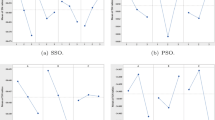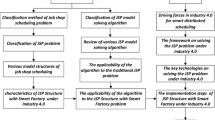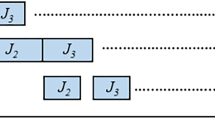Abstract
In this paper, we study a scheduling model in which the features of deteriorating jobs, serial batches, multiple job types, and setup times are considered simultaneously. In this proposed model, the jobs of each type are first partitioned into serial batches, and then all batches of different job types are processed on a single serial-batching machine. The actual job processing time is an increasing function of its starting time, and the setup time of the batches is sequence-dependent, i.e., setup time is required only when a new batch is processed first on the machine or immediately after a batch belonging to another job type. We develop optimization algorithms to solve the makespan minimization problem, the maximum tardiness minimization problem, the maximum lateness minimization problem, and the maximum earliness minimization problem, respectively. We also propose optimization algorithms to solve the problem of minimizing the number of tardy jobs under a certain agreeable condition. Finally, we discuss two special cases of the total completion time minimization problem and develop optimization algorithms to solve them.
Similar content being viewed by others
References
Agnetis, A., Detti, P., Meloni, C., & Pacciarelli, D. (2001). Set-up coordination between two stages of a supply chain. Annals of Operation Research, 107, 15–32.
Bai, J., Li, Z. R., & Huang, X. (2012). Single-machine group scheduling with general deterioration and learning effects. Applied Mathematical Modelling, 36, 1267–1274.
Browne, S., & Yechiali, U. (1990). Scheduling deteriorating jobs on a single processor. Operations Research, 38, 495–498.
Cheng, T. C. E., Ding, Q., & Lin, B. M. T. (2004). A concise survey of scheduling with time-dependent processing times. European Journal of Operational Research, 152, 1–13.
Detti, P., Meloni, C., & Pranzo, M. (2007). Minimizing and balancing setups in a serial production system. International Journal of Production Research, 45, 5769–5788.
Gawiejnowicz, S. (2008). Time-dependent scheduling, monographs in theoretical computer science. Berlin-Heidelberg: An EATCS Series, Springer.
Graham, R. L., Lawler, E. L., Lenstra, J. K., & Rinnooy Kan, A. H. G. (1979). Optimization and approximation in deterministic sequencing and scheduling: A survey. Annals of Discrete Mathematics, 5, 287–326.
Gupta, J. N. D., & Gupta, S. K. (1988). Single facility scheduling with nonlinear processing times. Computers and Industrial Engineering, 14, 387–393.
Huang, X., Wang, M. Z., & Wang, J. B. (2011). Single-machine group scheduling with both learning effects and deteriorating jobs. Computers and Industrial Engineering, 60, 750–754.
Huang, X., Li, G., Huo, Y., & Ji, P. (2013). Single machine scheduling with general time-dependent deterioration, position-dependent learning and past-sequence-dependent setup times. Optimization Letters, 7, 1793–1804.
Lai, P. J., Lee, W. C., & Chen, H. H. (2011). Scheduling with deteriorating jobs and past-sequence-dependent setup times. International Journal of Advanced Manufacturing Technology, 54, 737–741.
Lee, W. C., & Lu, Z. S. (2012). Group scheduling with deteriorating jobs to minimize the total weighted number of late jobs. Applied Mathematics and Computation, 218, 8750–8757.
Lee, W. C. (2014). Single-machine scheduling with past-sequence-dependent setup times and general effects of deterioration and learning. Optimization Letters, 8, 135–144.
Li, S. S., Ng, C. T., Cheng, T. C. E., & Yuan, J. J. (2011). Parallel-batch scheduling of deteriorating jobs with release dates to minimize the makespan. European Journal of Operational Research, 210, 482–488.
Liao, C. J., Tsai, Y. L., & Chao, C. W. (2011). An ant colony optimization algorithm for setup coordination in a two-stage production system. Applied Soft Computing, 11, 4521–4529.
Miao, C. X., Zhang, Y. Z., & Cao, Z. G. (2011). Bounded parallel-batch scheduling on single and multi machines for deteriorating jobs. Information Processing Letters, 111, 798–803.
Miao, C. X., Zhang, Y. Z., & Wu, C. L. (2012). Scheduling of deteriorating jobs with release dates to minimize the maximum lateness. Theoretical Computer Science, 462, 80–87.
Pei, J., Liu, X., Pardalos, P. M., Fan, W., & Yang, S. (2015). Single machine serial-batching scheduling with independent setup time and deteriorating job processing times. Optimization Letters, 9, 91–104.
Qi, X. L., Zhou, S. G., & Yuan, J. J. (2009). Single machine parallel-batch scheduling with deteriorating jobs. Theoretical Computer Science, 410, 830–836.
Wang, J. B., Lin, L., & Shan, F. (2008). Single-machine group scheduling problems with deteriorating jobs. International Journal of Advanced Manufacturing Technology, 39, 808–812.
Wang, J. B., Gao, W. J., Wang, L. Y., & Wang, D. (2009). Single machine group scheduling with general linear deterioration to minimize the makespan. International Journal of Advanced Manufacturing Technology, 43, 146–150.
Wang, J. B., & Sun, L. Y. (2010). Single-machine group scheduling with linearly decreasing time-dependent setup times and job processing times. International Journal of Advanced Manufacturing Technology, 49, 765–772.
Wang, J. B., Huang, X., Wu, Y. B., & Ji, P. (2012). Group scheduling with independent setup times, ready times, and deteriorating job processing times. International Journal of Advanced Manufacturing Technology, 60, 643–649.
Wang, D., Huo, Y. Z., & Ji, P. (2014). Single-machine group scheduling with deteriorating jobs and allotted resource. Optimization Letters, 8, 591–605.
Wu, C. C., Shiau, Y. R., & Lee, W. C. (2008). Single-machine group scheduling problems with deterioration consideration. Computers and Operations Research, 35, 1652–1659.
Xuan, H., & Tang, L. X. (2007). Scheduling a hybrid flowshop with batch production at the last stage. Computers and Operations Research, 34, 2718–2733.
Yang, S. J. (2011). Group scheduling problems with simultaneous considerations of learning and deterioration effects on a single-machine. Applied Mathematical Modelling, 35, 4008–4016.
Yin, Y., Cheng, S. R., & Wu, C. C. (2012). Scheduling problems with two agents and a linear non-increasing deterioration to minimize earliness penalties. Information Sciences, 189, 282–292.
Zhang, X., Yan, G., Huang, W., & Tang, G. (2001). Single-machine scheduling problems with time and position dependent processing times. Annals of Operations Research, 186, 345–356.
Acknowledgments
We are grateful to the editors and the anonymous reviewers for their helpful suggestions on an earlier version of this paper. This work is supported by the National Natural Science Foundation of China (Nos. 71231004, 71171071, 71131002), and Panos M. Pardalos is partially supported by LATNA laboratory, NRU HSE, RF government grant, ag. 11.G34.31.0057.
Author information
Authors and Affiliations
Corresponding author
Additional information
Dedicated to Dr. Panos Pardalos on the occasion of his 60th birthday (Pardalos60).
Rights and permissions
About this article
Cite this article
Pei, J., Liu, X., Pardalos, P.M. et al. Scheduling deteriorating jobs on a single serial-batching machine with multiple job types and sequence-dependent setup times. Ann Oper Res 249, 175–195 (2017). https://doi.org/10.1007/s10479-015-1824-6
Published:
Issue Date:
DOI: https://doi.org/10.1007/s10479-015-1824-6




